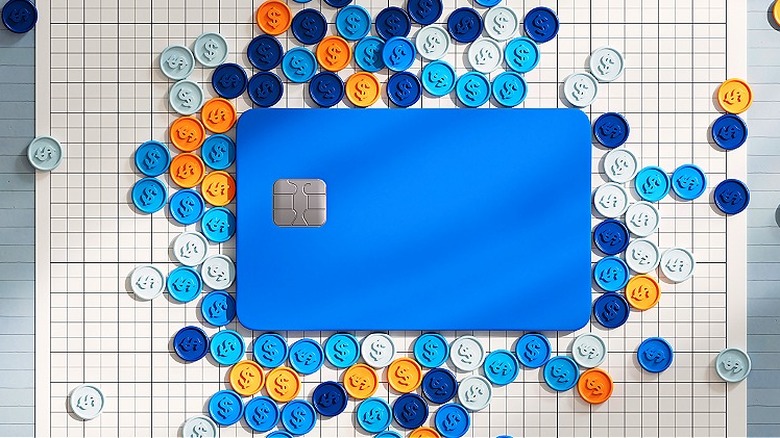Here Are The Best Ways To Strengthen Your Credit Score Through Your 20s
Everyone is concerned with their credit score, as it can dictate all manner of things in your financial life, specifically when it comes to borrowing money (for a home, a car, or more broadly). Interest rates can fluctuate wildly for borrowers depending on their credit score, with the best offers flowing to those with the highest scores and a long history of responsible debt management. As a result, younger borrowers are generally boxed into a corner in this regard.
Without a history of good credit card and/or personal loan stewardship, it can be difficult to nail down great rates in your 20s. However, there are plenty of solid choices you can make in these early years to set you up for success later on. Of course, managing your existing credit cards (here are key things to know before applying for a student card) and strategically adding new account types to your credit blend will help, but it's not just about that.
Get a credit card, perhaps a secured card
The first thing young borrowers in their 20s will want to do to strengthen their credit — and credit score — is to get a credit card. You won't be able to show good stewardship over borrowed funds if you don't have access to any. A credit card is the first step here and will help you to showcase solid financial stability. Any kind of credit card will do at this point in your financial journey; it doesn't have to be a cash-back option with great rewards. In fact, you might not qualify for one of these kinds of cards right away.
Some borrowers will even need to resort to using a secured card. You may qualify for an unsecured line of credit, but it's still worth considering a secured credit card anyway, even if you don't have to utilize one of these financial tools at the beginning of your voyage. A secured card is backed by what essentially amounts to a savings account you've paid into. You give the card company a pool of cash, perhaps $500, and then you have access to a credit limit in that same amount. Each month, you'll pay back into the reservoir rather than engaging in a classic borrowing relationship. This is good because it shows your ability to set aside money to fund the account initially, and it places some skin in the game, giving you a major incentive to keep current with your payments and account balance.
Don't use this new line of credit liberally
Once you've established a credit card account, the key thing is to use it sparingly and maintain a diligent repayment schedule. Having credit doesn't itself make for a steadily increasing credit score in your 20s. Instead, the way you utilize this funding will make or break your still-new credit history. By charging to the card with reckless abandon, you'll establish yourself as someone who can't responsibly manage your financial obligations, resulting in a stagnant or declining credit score. This can close off future options for funding all manner of life decisions, so it's crucially important to treat this debt arrangement as a major priority. (Read about things you should never pay with a credit card.)
You will want to use your card, but make sure you don't spend more on the account than you can reasonably pay off every month. Paying off your credit card in full each month establishes you as an intelligent borrower who can handle more responsibility. Note, a large portion of your credit score is dictated by the revolving-utilization figure and the amount of available credit you have. Using your credit card moves the needle on both of these figures in a negative direction.
As well, the more you spend on a credit card, the more potential there is to leave a balance rolling over into the next month. Revolving balances accrue interest, making the cost of the borrowed funds far more expensive and taking away from your financial stability in the future.
Pay your monthly bills on time
One aspect of building good credit as a twenty-something sits outside the realm of credit cards and loans. Your monthly bills — that is, rent or mortgage payments, electricity, gas, TV, and the like — can influence your credit score going forward. Some people may be able to leverage a history of on-time payments to subscription services and utilities to boost their score directly, but managing these bills well also plays an indirect role, too.
Finding yourself behind on budgetary necessities like these can negatively impact the balance you strike in a routine budget. Having to overpay on your electricity bill to make up for missed payments in the past limits the amount of capital you have available to you going forward. It's also a drain on your savings capabilities. You'll want to start saving regularly for retirement when you're in your 20s.
As you matriculate into the workforce as a full-time employee around this time, your salary will increase as your obligations remain limited. This makes for a great opportunity to set retirement savings as a priority early on, too, capitalizing on habit and a lengthy timeline to take advantage of compound interest. Maintaining good discipline with your bills beyond the credit card component of your financial picture sets you up for good standing across accounts and will help deliver better financial stability, an improved credit history, and more.
Ask for credit line increases (not new card accounts)
As you progress through your financial journey in your 20s, more credit-line opportunities will present themselves. An improving credit score and salary bumps will combine to offer you more and more opportunities to expand your borrowing power. Yet, it's worth remembering that an increased credit line and a new line of credit (via a second credit card, a personal loan, or some other avenue) aren't the same. New credit accounts require credit checks, which can negatively affect your credit score if too many are requested in close succession. Likewise, a new account opening generally means a temporary dip in your score in accordance with a hard inquiry.
Instead, it's a good idea to consider asking for a credit line increase on your existing accounts. These don't require a hard credit check and can improve the amount you're able to borrow in pursuit of a higher credit score. Generally speaking, if you take good care of your credit line, you should be able to enjoy an increased limit every six months, although timelines can/do vary among providers. Asking for an increased credit limit gives you more access without the drawbacks of opening a new account. This makes for a more beneficial utilization rate and total credit available. Building credit is all about responsible management and gradually improving trust between you and the lenders you partner with. This approach offers both with ease. (On that note, can having two credit cards build your credit more quickly?)




